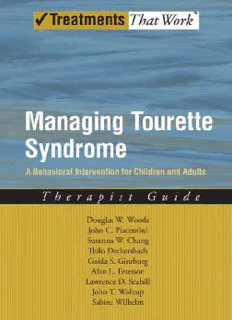
Managing Tourette Syndrome: A Behavioral Intervention for Children and Adults Therapist Guide (Treatments That Work) PDF
Preview Managing Tourette Syndrome: A Behavioral Intervention for Children and Adults Therapist Guide (Treatments That Work)
Managing Tourette Syndrome EDITOR-IN-CHIEF DavidH.Barlow,Ph.D. SCIENTIFIC ADVISORY BOARD AnneMarieAlbano,Ph.D. GillianButler,Ph.D. DavidM.Clark,Ph.D. EdnaB.Foa,Ph.D. PaulJ.Frick,Ph.D. JackM.Gorman,M.D. KirkHeilbrun,Ph.D. RobertJ.McMahon,Ph.D. PeterE.Nathan,Ph.D. ChristineMaguthNezu,Ph.D. MatthewK.Nock,Ph.D. PaulSalkovskis,Ph.D. BonnieSpring,Ph.D. GailSteketee,Ph.D. JohnR.Weisz,Ph.D. G.TerenceWilson,Ph.D. Managing Tourette Syndrome A BEHAVIORAL INTERVENTION FOR CHILDREN AND ADULTS T h e r a p i s t G u i d e • Douglas W. Woods John C. Piacentini • Susanna W. Chang Thilo Deckersbach • Golda S. Ginsburg Alan L. Peterson • Lawrence D. Scahill John T. Walkup Sabine Wilhelm 1 2008 1 OxfordUniversityPress,Inc.,publishesworksthatfurther OxfordUniversity’sobjectiveofexcellence inresearch,scholarship,andeducation. Oxford NewYork Auckland CapeTown DaresSalaam HongKong Karachi KualaLumpur Madrid Melbourne MexicoCity Nairobi NewDelhi Shanghai Taipei Toronto Withofficesin Argentina Austria Brazil Chile CzechRepublic France Greece Guatemala Hungary Italy Japan Poland Portugal Singapore SouthKorea Switzerland Thailand Turkey Ukraine Vietnam Copyright(cid:1)c 2008byOxfordUniversityPress,Inc. PublishedbyOxfordUniversityPress,Inc. 198MadisonAvenue,NewYork,NewYork10016 www.oup.com OxfordisaregisteredtrademarkofOxfordUniversityPress Allrightsreserved.Nopartofthispublicationmaybereproduced, storedinaretrievalsystem,ortransmitted,inanyformorbyanymeans, electronic,mechanical,photocopying,recording,orotherwise, withoutthepriorpermissionofOxfordUniversityPress. CIPdataonfile ISBN978-0-19-534128-7 9 8 7 6 5 4 3 2 1 PrintedintheUnitedStatesofAmerica onacid-freepaper About TreatmentsThatWorkTM Stunning developments in healthcare have taken place over the last severalyears,butmanyofourwidelyacceptedinterventionsandstrate- gies in mental health and behavioral medicine have been brought into questionbyresearchevidenceasnotonlylackingbenefit,butperhaps, inducing harm. Other strategies have been proven effective using the bestcurrentstandardsofevidence,resultinginbroad-basedrecommen- dations to make these practices more available to the public. Several recent developments are behind this revolution. First, we have arrived at a much deeper understanding of pathology, both psychological and physical, which has led to the development of new, more precisely tar- getedinterventions.Second,ourresearchmethodologieshaveimproved substantially,suchthatwehavereducedthreatstointernalandexternal validity, making the outcomes more directly applicable to clinical sit- uations. Third, governments around the world and healthcare systems andpolicymakershavedecidedthatthequalityofcareshouldimprove, that it should be evidence based, and that it is in the public’s inter- est to ensure that this happens (Barlow, 2004; Institute of Medicine, 2001). Of course, the major stumbling block for clinicians everywhere is the accessibility of newly developed evidence-based psychological inter- ventions. Workshops and books can go only so far in acquainting responsible and conscientious practitioners with the latest behav- ioral healthcare practices and their applicability to individual patients. This new series, TreatmentsThatWorkTM, is devoted to communicat- ing these exciting new interventions to clinicians on the frontlines of practice. v Themanualsandworkbooksinthisseriescontainstep-by-stepdetailed procedures for assessing and treating specific problems and diagnoses. But this series also goes beyond the books and manuals by providing ancillary materials that will approximate the supervisory process in assistingpractitionersintheimplementationoftheseproceduresintheir practice. In our emerging healthcare system, the growing consensus is that evidence-based practice offers the most responsible course of action for the mental health professional. All behavioral healthcare clinicians deeplydesiretoprovidethebestpossiblecarefortheirpatients.Inthis series, our aim is to close the dissemination and information gap and makethatpossible. ThistherapistguideaddressesthetreatmentofTourettesyndrome(TS) inchildrenandadults(ages9andolder).Thegoalofthis11-sessionpro- gramistoteachthepatienteffectiveticmanagementskillsratherthan to cure the tic disorder. A useful adjunct or alternative to medication, the treatment described in this guide is scientifically based and proven effective.Overthecourseoftheprogram,individualsaretaughthowto be aware of their tics, how to substitute other behaviors for their tics, and how to avoid factors that may make their tics worse. Relaxation techniquestoreducestress,whichcanexacerbateticsymptoms,arealso a part of therapy. Relapse prevention strategies help patients keep up theirprogressaftertreatmenthasended. Completewithstep-by-stepinstructionsforrunningsessions,aswellas listsofmaterialsneeded,sessionoutlines,andcopiesofformsnecessary for treatment, this therapist guide provides you with all the informa- tion you need to successfully treat tic disorders. Also available is a corresponding workbook for parents and their children, as well as a workbook designed specifically for your adolescent and adult clients. Together,thesebooksformacompletetreatmentpackagethatclinicians willfindtobeawelcomeadditiontotheirarmamentarium. DavidH.Barlow,Editor-in-Chief, TreatmentsThatWorkTM Boston,MA vi References Barlow, D. H. (2004). Psychological treatments. American Psychologist, 59, 869–878. InstituteofMedicine.(2001).Crossingthequalitychasm:Anewhealthsystem forthe21stcentury.Washington,DC:NationalAcademyPress. vii This page intentionally left blank Contents Chapter1 IntroductoryInformationforTherapists 1 Chapter2 AssessmentStrategiesforTouretteSyndrome 19 Chapter3 Function-BasedIntervention 27 Chapter4 HabitReversalTraining 39 Chapter5 Session1 55 Chapter6 Session2 71 Chapter7 Session3 77 Chapter8 Session4 83 Chapter9 Session5 89 Chapter10 Session6 97 Chapter11 Session7 103 Chapter12 Session8 109 Chapter13 BoosterSessions 115 AppendixofResources 119 References 121 AbouttheAuthors 129 ix
Description: